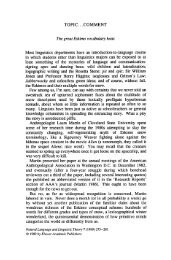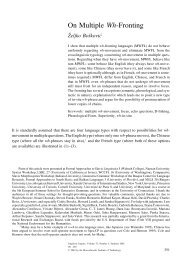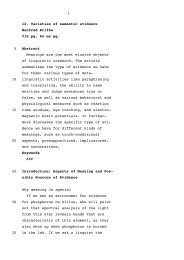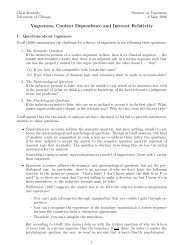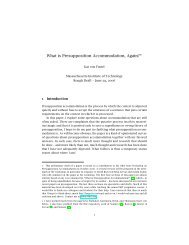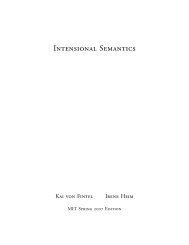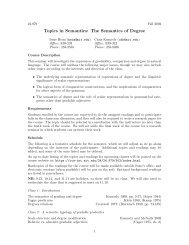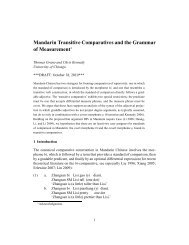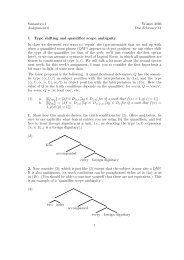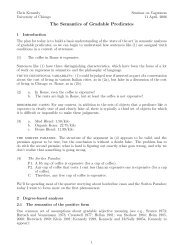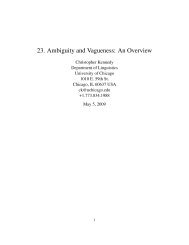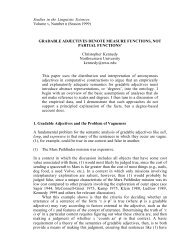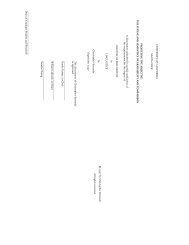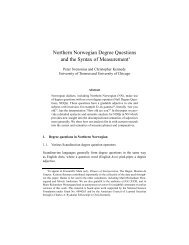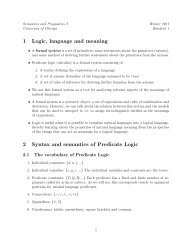On the natural history of negative polarity items - Syntax, Semantics ...
On the natural history of negative polarity items - Syntax, Semantics ...
On the natural history of negative polarity items - Syntax, Semantics ...
You also want an ePaper? Increase the reach of your titles
YUMPU automatically turns print PDFs into web optimized ePapers that Google loves.
Giorgio Magri<br />
distribution <strong>of</strong> <strong>the</strong> latter implicature is constrained in a complicated way (beyond <strong>the</strong> scope <strong>of</strong> this<br />
paper). And this is <strong>the</strong> source <strong>of</strong> <strong>the</strong> complicated distribution <strong>of</strong> BP’s readings. Thus, (5) says<br />
that <strong>the</strong>re is no need for a dedicated <strong>the</strong>ory <strong>of</strong> <strong>the</strong> distribution <strong>of</strong> BP’s readings; we need instead a<br />
<strong>the</strong>ory <strong>of</strong> <strong>the</strong> availability <strong>of</strong> <strong>the</strong> not-all implicature for overt indefinites, and that’s all we need.<br />
(5) An occurrence <strong>of</strong> <strong>the</strong> BP [; NP] has a generic (existential) reading iff <strong>the</strong> corresponding<br />
overt indefinite [some NP] triggers (doesn’t trigger) <strong>the</strong> not-all implicature out <strong>of</strong> <strong>the</strong> blue.<br />
The talk shows that (5) is indeed borne out on a number <strong>of</strong> classical cases, such as <strong>the</strong> following.<br />
⌅ Case #1. Readings <strong>of</strong> BP subjects correlate with predicate type (Carlson 1972): dogs has generic<br />
reading with <strong>the</strong> ILP carnivorous in (6a) and existential reading with <strong>the</strong> SLP play in (6b).<br />
(6) a. Dogs are carnivorous a 0 . Some dogs are carnivorous.<br />
b. Dogs were playing in <strong>the</strong> backyard. b 0 . Some dogs were playing in <strong>the</strong> backyard.<br />
This pattern (6a)/(6b) conforms to (5): out <strong>of</strong> <strong>the</strong> blue, some dogs triggers <strong>the</strong> not-all implicature<br />
in (6a 0 ) but not in (6b 0 ). This pattern (6a)/(6b) thus follows straightforwardly from (4).<br />
⌅ Case #2. BP objects can be existential independently <strong>of</strong> predicate type, as in (7a)-(7b). This<br />
conforms to (5): out <strong>of</strong> <strong>the</strong> blue, some dogs/lawyers trigger no not-all implicature in (7a 0 )-(7b 0 ).<br />
(7) a. John bought books. a 0 . John bought some books.<br />
b. John knows good lawyers. b 0 . John knows some good lawyers.<br />
c. John hates/loves lawyers. c 0 . John hates some/loves some lawyers.<br />
The intensional BP object lawyers in (7c) is instead construed generically. This pattern again<br />
conforms to (5), as some lawyers does trigger <strong>the</strong> not-all implicature in (7c 0 ).<br />
⌅ Case #3. Existential BPs only have narrow scope, as in (8a), thus lacking scope ambiguities.<br />
(8) a. Every boy read books. (89, ⇤ 98) b. Every boy read some books. (89, 98)<br />
Again, this pattern conforms to (5). I argue that when some books has wide scope wrt to every boy<br />
in (8b), it triggers <strong>the</strong> not-all implicature, as in “Some books are such that every boy read <strong>the</strong>m.”<br />
That is not necessarily <strong>the</strong> case when some books has narrow scope in (8b), as in “For every boy<br />
<strong>the</strong>re are some books he read.” When wide scoped, <strong>the</strong> BP books in (8a) thus only gets <strong>the</strong> generic<br />
reading, while <strong>the</strong> existential reading is only available when <strong>the</strong> BP is narrow scoped.<br />
⌅ Case #4. Surprisingly, BP subjects <strong>of</strong> ILPs get <strong>the</strong> existential reading if embedded under ano<strong>the</strong>r<br />
universal operator: (9a) can mean that for every man <strong>the</strong>re are women related to him (Fox 1995).<br />
(9) a. Jewish women are related to every jewish man.<br />
b. Some jewish women are related to every jewish man.<br />
In conformity with (5), some women in (9b) triggers no implicature when scoped below every man.<br />
⌅ Case #5. The BP typhoons in (10a) can be construed as existential or generic (Wilkinson 1991).<br />
(10) a. Typhoons arise in this part <strong>of</strong> <strong>the</strong> pacific. b. Some typhoons arise in this part <strong>of</strong> . . .<br />
In conformity with (5), some typhones in (10b) does or does not trigger <strong>the</strong> not-all implicature,<br />
depending on whe<strong>the</strong>r <strong>the</strong> sentence is construed as about typhoons or about this part <strong>of</strong> <strong>the</strong> pacific.<br />
⌅ O<strong>the</strong>r readings. (a) The BP students in (11a) is nei<strong>the</strong>r generic nor existential, ra<strong>the</strong>r equivalent<br />
to <strong>the</strong> definite <strong>the</strong> students (Condoravdi 1997). By (4), <strong>the</strong> reading predicted for this BP is existential<br />
plus <strong>the</strong> negation <strong>of</strong> <strong>the</strong> implicature triggered by some students in (11b). The latter implicature<br />
is that it is false that <strong>the</strong> students on campus were aware, not that all students in general were. The<br />
predicted meaning <strong>of</strong> (11a) is thus that <strong>the</strong> students on campus were aware, as desired.<br />
(11) a. In 1985 <strong>the</strong>re was a ghost haunting <strong>the</strong> campus. Students were aware <strong>of</strong> this fact.<br />
b. In 1985 <strong>the</strong>re was a ghost haunting <strong>the</strong> campus. Some students were aware <strong>of</strong> this fact.<br />
(b) For <strong>the</strong> kind-reading, I assume (as Diesing 1992 and Chierchia 1995) that BPs are ambiguous<br />
between kind-denoting terms and predicates with <strong>the</strong> null determiner ;; my proposal only applies<br />
to <strong>the</strong> latter. (c) To account for extreme narrow scope existential BPs (Carlson 1972), I assume<br />
that ; can take narrower scope than overt indefinites. My proposal crucially predicts that extreme<br />
narrow scope generic BPs cannot exist (as <strong>the</strong> alternative with <strong>the</strong> overt indefinite is unavailable).



